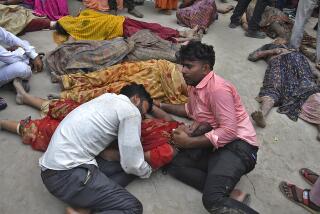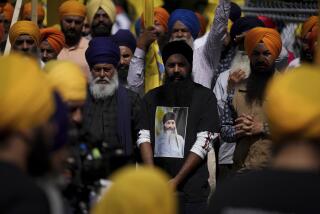Militants sneak into Indian army base and mow down sleeping soldiers in Kashmir, killing 18
In the deadliest attack against Indian forces in more than a decade, militants sneaked into an army encampment in the disputed territory of Kashmir early Sunday and opened fire on sleeping soldiers, killing 18 and wounding dozens.
The four assailants, who also threw grenades that caused tents and temporary shelters to catch fire at the army brigade headquarters at Uri, were killed in a gun battle with security forces that lasted six hours, authorities said.
Indian officials blamed the Pakistan-based militant group Jaish-e-Mohammed for the attack, saying it had recovered weapons from the assailants that carried Pakistani markings. Lt. Gen. Ranbir Singh, the director of military operations, said he contacted his Pakistani counterpart to convey “serious concerns.”
Pakistan is a terrorist state, and it should be identified and isolated as such.
— Indian Home Minister Rajnath Singh
Indian Home Minister Rajnath Singh was more pointed, saying on Twitter: “Pakistan is a terrorist state, and it should be identified and isolated as such.”
Pakistan denied involvement in the attack, which came amid escalating violence in the Indian-controlled portion of Kashmir.
Since Indian security forces killed Burhan Wani, a young Kashmiri militant, on July 8, the Himalayan territory — which both countries claim in its entirety — has erupted in protests. More than 80 civilians have been killed in clashes with Indian forces and hundreds more have been grievously wounded with pellet guns.
Ahead of this week’s United Nations General Assembly meeting, the countries have traded accusations, with Pakistan criticizing India for using excessive force in the majority-Muslim territory. The U.N. human rights chief last week requested permission to visit Kashmir to probe the allegations, but India denied the request.
India has stepped up allegations that Pakistan supports terrorism, and it vowed on Sunday to respond to the attack.
“We strongly condemn the cowardly terror attack in Uri,” Prime Minister Narendra Modi said. “I assure the nation that those behind this despicable attack will not go unpunished.”
The attack on Sunday appeared to have been well-timed. The brigade headquarters was in the middle of an operational handover, with one infantry battalion moving in as another was about to leave.
The troops “were stationed in tents/temporary shelters which caught fire, and resulted in heavy casualties,” the Indian army said in a statement.
Injured soldiers were transported about 25 miles away to Srinagar, the summer capital of Indian-ruled Kashmir. At least 14 of the wounded had suffered serious burns, officials said.
Indian security experts said the timing and planning of the attack suggested complicity or at least support from elements of the Pakistani security establishment, including the Inter-Services Intelligence, or ISI, the military spy agency. The agency is believed to support anti-India militant groups such as Jaish-e-Mohammed, a charge the spy agency denies.
“Reconnaissance of the target would have been inevitable, and use of unarmed [drones] for the purpose is most likely,” Rahul Bhonsle, a retired Indian general and security analyst, wrote in a commentary. “Alternately there could be information supplied from informers in the general area of Uri as well.
“Thus complicity of the Pakistan Army and the ISI is apparent.”
Kanwal Sibal, a former Indian foreign secretary, said it was unclear how India would respond. Some analysts said New Delhi was wary of launching an aggressive operation with world leaders gathering for the U.N. meeting and civilians still protesting in the Kashmir valley.
“The fact is there cannot be such a potent attack by terrorists causing so many casualties unless there is a huge amount of training and guidance and support,” Sibal said. “And our position is a little more difficult this time because of the uprising in the valley.”
India and Pakistan — nuclear-armed rivals that have fought three wars over Kashmir since 1947 — have seen relations plummet to their lowest point in years. Just last Christmas, Modi visited Pakistani Prime Minister Nawaz Sharif at his home in Pakistan in what was seen as a confidence-building move ahead of negotiations between the country’s top diplomats.
Those hopes were shattered days later, following a raid by militants against a high-security Indian air base in Pathankot, in Punjab state, in which seven soldiers were killed. Indian officials blamed Jaish-e-Mohammed, but Pakistan said it found no evidence the group was involved.
Since then, six minor cross-border attacks have occurred inside India, showing serious lapses in Indian security, said Sibal.
“This camp is in a very exposed area, a vulnerable area,” he said. “And that this has happened is inexcusable.”
Special correspondent Parth M.N. reported from Mumbai and staff writer Bengali from Jalalabad, Afghanistan.
ALSO:
India swiftly rejects U.N. request for a visit to the disputed territory of Kashmir
Why millions of Indian workers just staged one of the biggest labor strikes in history
Friday isn’t just for prayers in Iran. For car enthusiasts, it’s also race day
UPDATES:
Sept. 27, 11:33 a.m.: This article was updated to reflect the most recent death toll.
This article was originally published Sept. 18 at 1:30 p.m.
More to Read
Sign up for Essential California
The most important California stories and recommendations in your inbox every morning.
You may occasionally receive promotional content from the Los Angeles Times.






